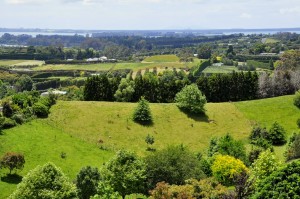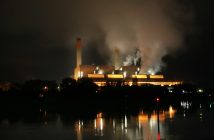Climate change is “by far” the most serious environmental issue facing New Zealand, according to the Parliamentary Commissioner for the Environment Dr Jan Wright.

One of New Zealand’s biggest environmental problems is erosion caused by bush clearance on unstable soils by long ago farmers
“We are lucky to live in an exceptionally beautiful country, but we have some big issues to face up to,” she admits. “Already temperatures are increasing, the ocean is acidifying, and the sea is rising.”
The commissioner’s commentary on the government’s Environment Aotearoa 2015 report that was the first prepared under the Environmental Reporting Act found that:
- While water quality is good in forested areas, it is poor in many lowland places
- Our native plants and animals are losing the war against pests
- We still have huge areas of eroding hill country
- Our oceans are under pressure from run-off and fishing, although the greatest pressure in the long-term is acidification and warming from climate change
- In contrast, the outlook for air quality is good – it looks set to continue improving.
She notes four areas that stand out as needing particular attention:
- Reducing transport emissions to create low carbon cities
- Establishing more marine protected areas to protect precious parts of our oceans
- Reforesting eroding hills to protect soil and reduce sediment in rivers
- Figuring out how to win the war against the predators killing native birds and animals.
The causes of environmental damage are many and varied, Wright admits, noting that whatever is done with the land has effects on the environment. “In urban areas, the steady rise of greenhouse gas emissions from transport stands out for particular attention.”
Agriculture is a huge part of the New Zealand economy and has a big impact in much of the country. “One of our biggest environmental problems is the legacy of erosion we have inherited across much of the country – caused by bush clearance on unstable soils by long ago farmers who believed they were doing the right thing,” Wright observes. “In protected conservation lands, we are fighting a war against predators such as possums, rats and stoats.”
One of the biggest challenges for New Zealand is transport emissions. “We need to work towards making our cities low-carbon as well as affordable,” Wright maintains.
Another major challenge is greenhouse gas emissions from agriculture, which will be the subject of the commissioner’s next report. “Tackling climate change will involve bold leadership from the government,” Wright adds.
While the government has made efforts to tackle some of these challenging issues, there is still much more that needs to be done, she insists. “For example, reforesting our eroding hills will keep soil on the land and out of rivers, and help fight climate change.”
Both Environment Aotearoa 2015 and the commissioner’s commentary assessed the environment at a national level, which didn’t include a comparison of the performance of different regional councils.
However, the commissioner has stressed that reports in the future should provide more information on where different issues are significant and where they are not. “Another benefit of the new reporting system is that it will drive more consistent measurement and monitoring of the environment across the country,” Wright observes.
The commissioner has recommended a formal response from the Secretary for the Environment, detailing how the ministry will deal with the issues raised in her commentary.
The Environmental Reporting Act requires the commissioner to provide commentary on reports prepared by the Ministry for the Environment and Statistics New Zealand, including the ‘synthesis’ state of the environment report every three years.
Between synthesis reports, they must also produce five environmental ‘domains’ at the rate of one every six months covering air, atmosphere and climate, freshwater, land and marine.
Dr Wright commended the Ministry and Statistics New Zealand on what they have achieved in a limited amount of time, but identified several areas for improvement:
- The purpose of state of the environment reporting should be to inform the public and decision-makers of the current state and long-term trends in the environment, identifying and explaining environmental issues, including their causes and location, and containing conclusions about their significance
- Environmental issues form the basis for structuring domain and synthesis reports, enabling a coherent ‘story’ to be written about each environmental issue, using both explanation and quantitative indicators, and drawing on the logic of the pressure-state-impact framework
- Relevance to environmental issues should be used as the primary criterion for selecting environmental indicators, with more input from a variety of technical advisors
- Both domain and synthesis reports should contain outlooks for different environmental issues, as is done with Australia’s state of the environment reports
- Both domain and synthesis reports should contain conclusions on the relative significance of different environmental issues, with the conclusions made transparently on a reasoned basis.
- The Secretary for the Environment should prepare a report for the Minister for the Environment, outlining priorities for action in response to the findings of Environment Aotearoa 2015 and this commentary, and make the report publically available.
Statistics New Zealand and the Ministry for the Environment welcomed the commissioner’s commentary, secretary for the Environment Vicky Robertson saying Dr Wright’s contribution serves as “valuable guidance” at this early stage of the environmental reporting journey.
“The Ministry for the Environment and Statistics NZ want environmental reports to be useful to as many people as possible,” Robertson adds. “Dr Wright’s report is very welcome in helping us achieve that goal.”




